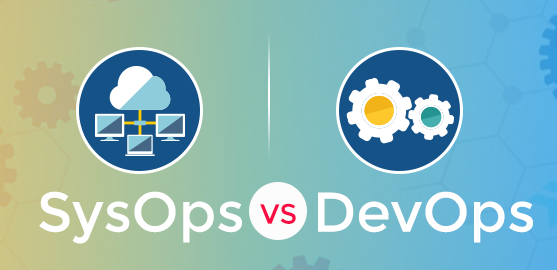DevOps is not a new approach in software development but it is still a growing area. We can call DevOps the most efficient way to make software nowadays. This technology exists for more than ten years but there are still a lot of companies that use outdated methodologies because of unwieldy legacy systems that are hard to transform into DevOps. But the majority of companies understand the importance of transformation, so, DevOps is still quite a demanded domain. Also, the new branches arise in the DevOps field. For example, SecOps and AIOPs who work with security and Artificial Intelligence.
Besides, there is one more specialty that often gets confused with DevOps. It is SysOps or System Operations. These specialists often maintain legacy systems or simplify some internal company systems. So, today we will distinguish the difference and understand what DevOps services include and what сan SysOps engineers do.

Who is a DevOps engineer?
DevOps is the practical implementation of Agile methodology. Agile is a flexible approach to software development. Before the introduction of Agile and DevOps, the developers used Waterfall – a methodology of strict planning. So, a DevOps engineer is a person working with a specific set of tools for automation. Also, a DevOps engineer has to have work experience in system administration in the past.
The main idea of DevOps is the automation of routine manual processes. After a system administrator works with manual scripts for a long time, he starts to understand the importance of automation. After working with cloud infrastructure and gathering experience with new toolset, workflows and best practices, the system administrator becomes a DevOps engineer.
The DevOps methodology provides such principles as Continuous Integration, Continuous Development, Continuous Testing and Continuous Monitoring. These principles are accomplished by changing the approach to development, cloud migration and DevOps transformation. Migration and transformation might include the whole system redesign, it is especially relevant for legacy systems. DevOps specialist uses different open-source and paid tools like Kubernetes, Jenkins, Terraform, Ansible, Docker and others.

In very simple words we can say that DevOps combine system administrator’s and developer’s skills but it will be very inaccurate meaning. There is a huge myth that DevOps skills combine these two specialties. In reality, DevOps is more about the administration. Such specialists need to have at least one-two years of experience as a sysadmin and after that, they can grow to the DevOps engineer.
Who is the SysOps specialist?
SysOps or System Operations is one more name for the system administrator. This is the person who works with servers and other hardware, software deployment environments, etc. In the past all the engineers who worked with hardware – from operating system setup to working with servers – were called the sysadmins. Nowadays this is a more narrow term and such specialists work with multi-user systems. Responsibilities os SysOps might include patch management, monitoring, stress management, software lifecycle management, full-stack management, etc.
SysOps also works with cloud computing but the main difference with DevOps is the approach to work. SysOps can work with the same area that DevOps but SysOps specialists work predominantly manually when DevOps engineers create an automation cycle of software development.

Wrap up: what’s the difference?
We defined DevOps and SysOps and considered what each of them does. If you try to find out, who you need to hire, the answer is – both. These professionals do different kinds of work, use different tools and technologies. The combination of both approaches will give you the maximum results.
DevOps and SysOps both manage the infrastructure and help to make software development a smooth and easier process. There is a list of common responsibilities of these talents:
- estimation of load predictability;
- determining when traffic falls down and shoots;
- system scalability setting;
- setting the frequency of software releases.
DevOps also makes all these processes automated. In the DevOps approach, the software development process is accomplished with small batches of code. In addition, automated testing and deployment allow making frequent releases and fast updates. While SysOps can’t provide such frequent releases, because for each test and deployment task SysOps makes the environment manually.
If you can’t allow hiring both, you should choose according to your company’s needs. You can refer to Managed Service Provider (MSP) that will make an assessment of your infrastructure and consult you about the talents you need. Also, MSP can provide you with necessary specialists or even the dedicated team, if needed. Experienced MSP can make a full assessment of the current system, make the strategy of DevOps transformation or a cloud migration, provide you a team for these tasks and maintain the project after all the actions.

